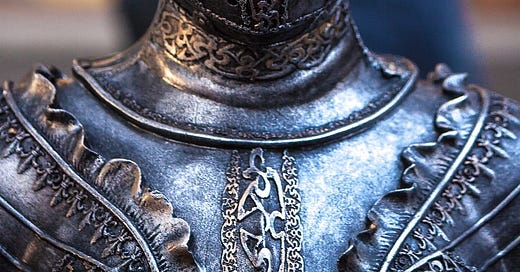The Difference Between Having Thick Skin And Armor At Work & Why Leaders Need To Have Thick Skin But Lose The Armor
Thick skin and armor are not the same thing, one slows you down, but the other one keeps you safe when you're taking hits on the field. Thick skin is crucial for leaders but why?
This is an exclusive article for paid members only. To become a paid member, go here and subscribe, or order a copy of my new book, and send proof of purchase to bonus@thefutureorganization.com to get 6 months of free access for new subscribers (offer expiring in 2 days!)
One of the things I talk about in my new book, Leading With Vulnerability, is the importance of having thick skin, especially if you are or want to be in a position of leadership. However thick skin and armor are not the same thing.
There’s an assumption that armoring up means not showing emotion but that’s not entirely true. Armoring up also means avoiding situations and circumstances that would require you to show any emotion or be human to begin with. Some leaders do this by shutting down difficult conversations, avoiding certain topics, or using their power and authority to get others to bend to their will without questioning authority. Bad leaders never take the hits because they don’t even put on the uniform to join their team on the field. Great leaders take the hits for their people and keep charging everyone towards the end zone. That's what having thick skin is all about.
Armor is heavy and uncomfortable and if you wear it all the time it will exhaust and drain you which is exactly what happened to Penny Pennington, the CEO of Edward Jones, a financial services firm with over 50,000 employees.
Here’s what Penny shared with me and below we will take a look at more at what thick skin means and why it’s so crucial for leaders today, especially if you want to lead with vulnerability.
Keep reading with a 7-day free trial
Subscribe to Future Ready Leadership With Jacob Morgan to keep reading this post and get 7 days of free access to the full post archives.




